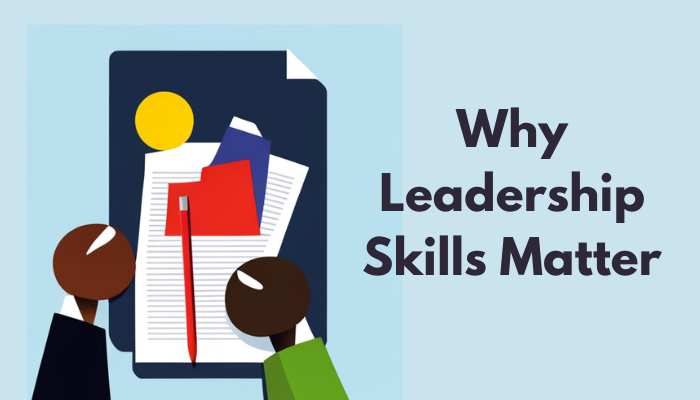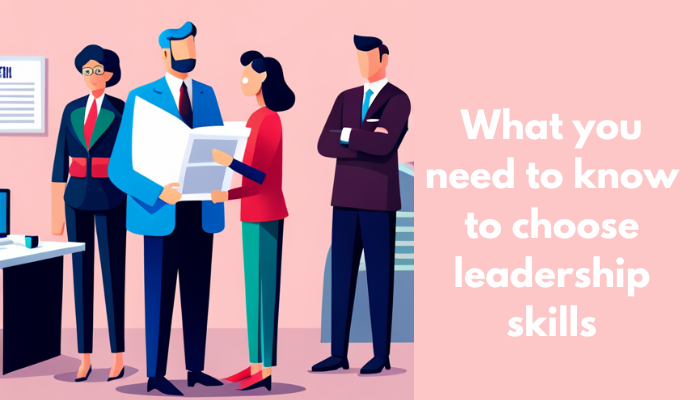
Today’s pace of change and the requirement for effective leadership has never been higher. Different scales, same thing Whether managing a small team to spearheading an organization-wide transformation: the critical leadership skills will make – or break! – your career. Through this blog, you will learn about the leadership abilities getting familiar with that can enhance your career.
Why Leadership Skills Matter
| Positive Aspects | Negative Aspects |
|---|---|
| 1. Enhanced Leadership Effectiveness | 1. Time-Consuming Process |
| Knowing how to choose the right skills helps you become a more effective and impactful leader. | The process of identifying and selecting the appropriate leadership skills requires considerable time and effort. |
| 2. Improved Team Performance | 2. Risk of Skill Misalignment |
| Properly chosen leadership skills can lead to improved team dynamics, productivity, and morale. | There is a risk that the selected skills may not perfectly align with the team’s specific needs or the organizational culture. |
| 3. Better Goal Alignment | 3. Complexity in Skill Selection |
| Choosing the right leadership skills helps align your leadership approach with organizational goals and objectives. | The selection process can be complex, involving a careful evaluation of various skills and their relevance to your specific context. |
| 4. Increased Personal Credibility | 4. Requires Ongoing Adaptation |
| Developing and applying the right skills boosts your credibility and influence as a leader within the organization. | Leadership skills need to be continually adapted and updated to keep up with evolving challenges and organizational changes. |
| 5. Facilitates Growth and Development | 5. Potential for Skill Overlap |
| Selecting appropriate skills supports both personal and professional growth, enhancing overall leadership capabilities. | Some leadership skills might overlap or conflict with existing skills, potentially leading to confusion or redundancy. |
We know that leadership skills are invaluable for everyone who is working in the organization, but it essential not only to CEOs and managers. Effective leadership can help your team morale, productivity and innovation access it will improve. These are must have skills for anyone who wants to rise in corporate hierachys.
In Career Growth, how Leadership matters
Good leaders open up new opportunities. It displays your professionalism… about having the balls to lead, execute and rally a team toward shared purpose. Ability to get promoted or move up career ladders leadership skills are typically what separate the good from the great.
The Dynamics of Team Leadership
A well instructed leader can unify a group of individuals into one seamless body. Leaders actively invest in creating a supportive and inclusive climate can enable stronger team collaboration, performance and ultimately better organizational outcomes.
Leadership or how to save money
Companies benefitting from strong leadership outperform their competitors. This means that influential leaders can make strategic decisions which in turn drives business growth and profitability. Investing in leadership development pays dividends for an organization and therefore makes it one of the smartest financial investments a company can make.
Leadership Skills You Absolutely Need to Work On
A good leader is always looking to improve on their skills. The most important ones can strive to be:
Communication
Good leadership all starts with clear and effective communication. It is about the sharing of thoughts, and hearing out others.
Watch this interview for a better look inside the mind of an active listener…Title…it will be added later… This increases credibility and promotes candid conversation.
Transparency: One-line honesty act like a bomb defused in the middle of someone trying to understand your context, most likely you have given out enough indication but others need more transparency.
Non-Verbal Communication: Body langauge and tone of voice are important in bringing a message to the recipient.
Emotional Intelligence
One of the things that determines whether or not you’ll succeed in leadership is how well you can understand and manage your feelings, as good as those of others. Emotional intelligence helps in bettering the way you maintain your relationships, it makes it easier for you to manage disagreements with implied solutions.
- Self-awareness (Being aware of your emotions and how they impact you)
- Empathy: Ability to have a realization of and connection with the thoughts and emotions
- Social Skills: Cultivating rapport and synergy with team members
Decision-Making
Good leaders are decisive. They research, cherry pick the pros and cons of this information so they decide quicker, with knowledge.
- Critical Thinking to Analyze Multiple Perspectives in making better decisions.
- Problem-Solving – Create methods to face and solve difficult circumstances
- Risk Management: Analyze the potential risks and act accordingly.
Adaptability
The tactic of business is at all times evolving. They are able to pivot strategies and adapt to a changing environment because they have the courage not only of their convictions, but also in themselves as leaders.
- Open-mindedness: Listening to new ideas and trying things with different perspectives.
- Resilience: Failure is just a temporary hiccup, get over it and move on.
- Innovative: Emphasize the importance of creative thinking and innovation among your team.
Delegation
Good leadership is all about good task delegation. It enables your team and you to concentrate on more strategic activities.
- Trust in your team – believe they can deliver.
- Clarity: Give appropriate steps and as well expectations,
- Support: Guide and support when necessary, but be careful not to micromanage.
Bringing It All Together
The cultivation of these leadership skills will help get you on your way to becoming a more impactful leader, one with the ability to create powerful positive lasting change. The same is true for leadership – it’s something you work at every day. Get feedback, think about how you are doing and learning form your experiences.
How to Develop Your Skills
Ask for Support: Connect with leaders who are likely to have experienced the same challenges and ask them how they dealt with it.
- Participating in leadership workshops and training programs.
- Be Well-Read: Keep current with the latest leadership trends and best practices by reading books, papers etc.
- Applying Leadership Ability to everyday life
Leadership does not only emanate from within the workplace. These are things you could also practice with community service, volunteer work and even from family abolishment. The more you do them, the easier it will get.
Measuring Your Progress
Establish measurable objectives around your leadership journey and monitor how you are improving. Describe the extent to which you have improved, using feedback from peers and mentors as reference points.
What you need to know to choose leadership skills
| Pros | Cons |
|---|---|
| 1. Improved Decision-Making | 1. Time Investment |
| Knowing which leadership skills to develop helps enhance decision-making abilities and overall effectiveness. | Identifying and cultivating the right leadership skills requires significant time and effort. |
| 2. Better Team Dynamics | 2. Risk of Misalignment |
| Choosing the right leadership skills fosters better team dynamics, collaboration, and morale. | Focusing on certain skills might lead to misalignment with team needs or organizational goals, potentially affecting team performance. |
| 3. Enhanced Personal Growth | 3. Can Be Overwhelming |
| Understanding and developing the appropriate leadership skills contributes to personal and professional growth. | The process of choosing and mastering the right skills can be overwhelming, especially when balancing multiple skill areas. |
| 4. Increased Credibility and Influence | 4. Requires Continuous Adaptation |
| Effective leadership skills enhance your credibility and influence within the organization and among peers. | Leadership skills need to be continuously adapted and refined based on evolving roles and organizational changes. |
| 5. Better Alignment with Organizational Goals | 5. Potential for Skill Overlap |
| Selecting leadership skills that align with organizational goals ensures that your leadership approach supports broader objectives. | Some leadership skills may overlap or be redundant with existing skills or roles, leading to inefficiencies in skill development. |
FAQ
What leadership skills are the most essential to elevate your career?
Communication, Emotional Intelligence, Decision-making and/or problem-solving ability & Adaptability beyond these delegation is another one of the most important leadership skills that can decide your professional growth. They can manage and inspire their team effectively, make better decisions and also face changes from the external circumstances of business.
How can I be a better leader?
High level learning and practice are required to develop better leadership skills Find mentorship from leaders who are more seasoned, go through leadership workshops and trainings, read a lot about the best practices in leadership,and solicit feedback often to identify areas of opportunities.
The Power of Emotional Intelligence for Leaders
Leadership requires the uncommon skill of emotional intelligence that helps in recognizing your emotions and therefore controlling them along with being aware about others feeling and thoughts. Good emotional intelligence leads to better relationships, solving conflict from the root and team motivation.
So why does effective communication increase team performance?
It is quite clear that proper communication leads ensures the roles, responsibilities and goals which each team member must be aware of. Creates trust, minimizes assumptions and helps working together as a team effectively leading to better overall performance of the teams.
How does adaptability plath a role in leadership?
Adaptable: Adaptability enables leaders to cope with change and uncertainty, they are able to mold their strategies based on new circumstances. It is a means to allow for the leadership necessary to keep pace in dynamic environments, encourage innovation and sustain improvement.
Is it possible to develop leadership skills apart from office premises?
Sure, leadership skills are learned in different settings other than the workplace such as community activities, volunteer work or family interactions;. Experiencing these talents in diverse situations is very beneficial for an all-inclusive leadership competency.
How do I track my progress in building the leadership skill?
Create measurable leadership-development goals and chart your progress over time. Ask for feedback from your peer, mentor and team to evaluate how much you have improved in the span! Get feedback, self reflect on your works and keep growing.







Your creative solutions to problems are always insightful. You have a real talent for thinking outside the box
Thank you very much for your feedback
You’ve done a great job of fostering a collaborative environment. Your approach encourages everyone to contribute their best
Thank you very much for your feedback